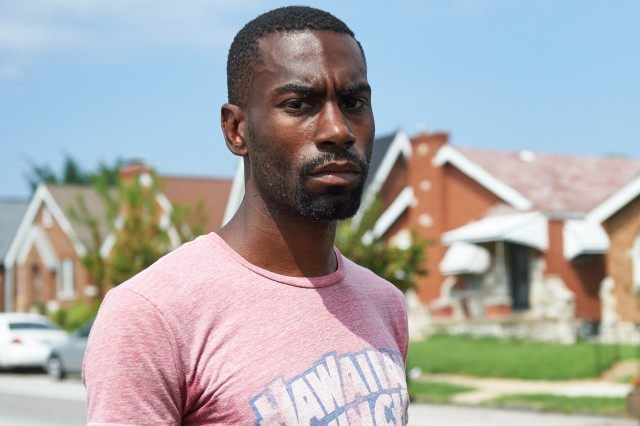To commemorate the one-year anniversary of Mike Brown’s death, the New York Times published a video in which three individuals–Johnetta Elzie, DeRay McKesson (pictured) and Zellie Imani–discuss their history of Twitter activism inspired by the case.
All three of the individuals in the video say Brown’s death and the protests that followed shaped them into activists. Johnetta Elzie (aka @Nettaaaaaaaa) says seeing people tweet things like, “It’s just another dead black boy. No one’s going to care” in her timeline made her determined to speak up. She spoke up in hope that someone out there would care about what she had to say.
But the video doesn’t spend much time on what Elzie actually did have to say, and there’s an obvious reason for that if you look at her tweets from the day Mike Brown died:
MURDERED, by the police* RT @FOX2now: Man shot, killed in Ferguson apartment complex #STL http://t.co/8GkTVfE80E
— ShordeeDooWhop (@Nettaaaaaaaa) August 9, 2014
They stole this baby’s future away. He had only till Monday to start college. Executed for walking down the street.
— ShordeeDooWhop (@Nettaaaaaaaa) August 10, 2014
It’s still blood on the ground where Mike Brown Jr was murdered. A cone in place where his body laid for hours today. #STL #Ferguson — ShordeeDooWhop (@Nettaaaaaaaa) August 10, 2014
Elzie certainly wasn’t the only person suggesting Mike Brown had been murdered last August. As we now know, some of the early reports were wrong about what happened. But Elzie has continued to promote her view of Brown’s death ever since:
Mike Brown was murdered in 100 days ago. — ShordeeDooWhop (@Nettaaaaaaaa) November 16, 2014
As recently as last week, she was still claiming Mike Brown was murdered, contradicting the evidence which the DOJ concluded shows otherwise:
Darren Wilson murdered Mike Brown Jr. and recently in an interview said he doesn’t regret it. That’s St. Louis racism for you. Bold.
— ShordeeDooWhop (@Nettaaaaaaaa) August 6, 2015
Zellie Imani, who also appears in the NY Times video today, reads a tweet he wrote the day the decision not to indict Officer Wilson was announced: “Another non-indictment. Another declaration by America that black life has no value.” Once again, no attempt is made to put this statement in context as we look back a year later. After two autopsies and an exhaustive DOJ report, we know Imani’s tweet was wrong. In fact, that was the real message of the non-indictment for anyone who was paying attention: the early reports of how Brown died were factually wrong. That Elzie is calling the shooting “murder” even now amounts to nothing more than a conspiracy theory.
Deray McKesson, the best known activists of the three, was promoting a separate but similar conspiracy theory about Sandra Bland’s death just last month. On July 21st Deray tweeted, “#SandraBland was murdered by the Waller County PD & the only reason it wasn’t swept under the rug is Twitter.”
Three days later, Bland’s autopsy results were released. Her death was judged to be consistent with suicide and she had weeks-old marks on one arm consistent with self-harm behavior. Deray made clear he didn’t believe the official story. Responding to the reports of the scars on Bland’s arm he tweeted, “The cover-up is thick.” He also reiterated his belief it was murder not suicide:
After being here in Waller County, I’m certain that they killed #SandraBland.
— deray mckesson (@deray) July 24, 2015
Deray isn’t alone in this view. He and Johnetta Elzie were both arrested Monday in St. Louis. Just before the arrest, Elzie tweeted:
If I’m arrested today please know I’m not suicidal. I have plenty to live for. I did not resist, I’m just black. — ShordeeDooWhop (@Nettaaaaaaaa) August 10, 2015
It’s an obvious reference to Sandra Bland, one which only makes sense if you believe police staged Bland’s murder to look like suicide (and might do the same to Elzie). Zellie Imani highlighted Elzie’s tweet suggesting that was indeed the case since she’s, “a black woman in America.” In other words, Elzie, like Sandra Bland, is at risk of being murdered. Except of course that Sandra Bland wasn’t murdered, she committed suicide.
It’s difficult to imagine the the NY Times celebrating the Twitter activism of anyone who engaged in, say, 9/11 trutherism or birtherism. That’s especially true when, as here, the conspiracy theorizing is central to the issue at hand and the activism being celebrated. But at the NY Times it all goes completely unmentioned. The activists are invited to read their tweets, just not the ones that call into question their legitimacy as commentators on this story.

COMMENTS
Please let us know if you're having issues with commenting.